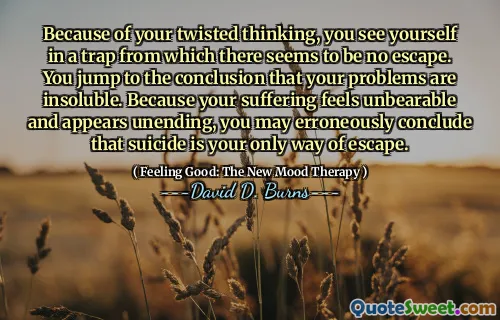
Because of your twisted thinking, you see yourself in a trap from which there seems to be no escape. You jump to the conclusion that your problems are insoluble. Because your suffering feels unbearable and appears unending, you may erroneously conclude that suicide is your only way of escape.
This quote highlights the destructive impact of distorted thought patterns on one's mental health. It emphasizes that our perceptions significantly influence our emotional states and behaviors. When individuals interpret their circumstances through a lens of negativity and hopelessness, they may come to believe that their suffering is unending, which can lead to feelings of helplessness. The phrase 'twisted thinking' suggests cognitive distortions—such as catastrophizing, overgeneralization, or all-or-nothing thinking—that can magnify difficulties and obscure potential solutions. Recognizing these distortions is crucial because it opens the door to challenging and reframing negative beliefs. Cognitive-behavioral strategies often focus on identifying such patterns and replacing them with more realistic, balanced thoughts. The quote also underscores the importance of hope and perspective, reminding us that difficulties are often temporary and that alternative viewpoints can reveal avenues for recovery and relief. It is essential for individuals struggling with thoughts of despair to seek help, as troubles are rarely as insurmountable as they might seem in a distorted mind-set. Addressing these cognitive distortions can prevent tragic outcomes and foster resilience. Ultimately, it is a call to re-examine our thought processes and recognize our capacity to change how we interpret our experiences, which can significantly improve mental well-being and provide reasons to persist through challenging times.







